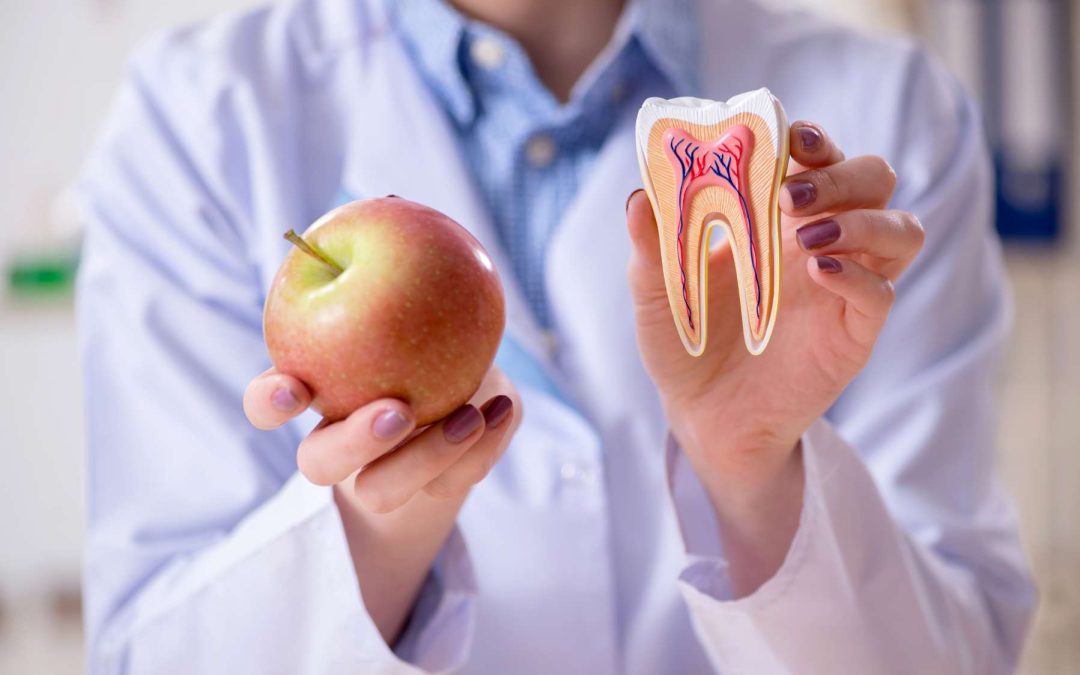When it comes to oral health, most people think of brushing, flossing, and regular dental checkups. While these are crucial, nutrition plays an equally important role in keeping teeth and gums strong. The foods you eat directly affect your mouth’s ability to fight plaque, prevent cavities, and maintain healthy gums. This article explores how proper nutrition contributes to dental health, the best foods to include in your diet, and which ones to avoid.
The mouth is the entry point for food and drinks, making it highly vulnerable to bacteria, acids, and sugars. Poor nutrition weakens the teeth and gums, leading to problems such as:
- Tooth decay (cavities)
- Gum disease (gingivitis and periodontitis)
- Tooth sensitivity
- Bad breath
- Weakened enamel
A balanced diet rich in essential nutrients helps strengthen teeth, fight harmful bacteria, and maintain long-lasting oral health.
Calcium is the building block of strong teeth and bones. It helps remineralize enamel and prevents tooth decay.
Sources: Milk, cheese, yogurt, leafy greens, almonds.
Vitamin D improves calcium absorption and supports healthy gums. Without it, teeth can become weak and prone to cavities.
Sources: Sunlight, fatty fish (salmon, mackerel), eggs, fortified dairy products.
Phosphorus works alongside calcium to protect and rebuild tooth enamel.
Sources: Meat, fish, nuts, beans, whole grains.
Vitamin C strengthens the immune system and supports gum tissue health. A deficiency can lead to bleeding gums and gum disease.
Sources: Citrus fruits, strawberries, bell peppers, broccoli.
Vitamin A helps maintain saliva production, which protects against dry mouth and promotes healing of oral tissues.
Sources: Carrots, sweet potatoes, spinach, eggs, fish oils.
Antioxidants fight harmful bacteria and reduce inflammation in the gums.
Sources: Berries, green tea, nuts, beans.
Staying hydrated helps wash away food particles and reduces acidity in the mouth, lowering the risk of cavities.
Sources: Plain water is best, especially fluoridated water for added enamel protection.
- Dairy products (milk, cheese, yogurt) – Rich in calcium and casein, which strengthen enamel.
- Crunchy fruits and vegetables (apples, carrots, celery) – Natural cleaners that stimulate saliva production.
- Leafy greens (spinach, kale) – Packed with vitamins and minerals for gum health.
- Nuts and seeds (almonds, sunflower seeds) – Provide protein and minerals like phosphorus and magnesium.
- Green tea – Contains polyphenols that reduce bacteria growth and bad breath.
- Water – Neutralizes acids and keeps the mouth moist.
- Sugary foods and drinks (candies, sodas, pastries) – Fuel bacteria that cause cavities.
- Sticky foods (caramels, dried fruits) – Cling to teeth and increase plaque buildup.
- Acidic foods and drinks (citrus juices, soft drinks) – Erode enamel over time.
- Alcohol – Causes dry mouth and increases gum disease risk.
| Nutrient | Main Function | Food Sources |
|---|---|---|
| Calcium | Strengthens enamel, prevents decay | Milk, cheese, yogurt, leafy greens, almonds |
| Vitamin D | Enhances calcium absorption | Sunlight, fatty fish, eggs, dairy |
| Phosphorus | Protects enamel, rebuilds teeth | Meat, fish, nuts, beans, whole grains |
| Vitamin C | Strengthens gums, prevents bleeding | Citrus, berries, peppers, broccoli |
| Vitamin A | Maintains saliva and tissue healing | Carrots, sweet potatoes, spinach, eggs |
| Antioxidants | Reduce inflammation and fight bacteria | Berries, green tea, nuts, beans |
| Water | Washes away food particles, prevents decay | Plain water, fluoridated water |
Nutrition is just as important as brushing and flossing when it comes to oral health. By including nutrient-rich foods such as dairy, leafy greens, and crunchy vegetables in your diet, and limiting sugary and acidic foods, you can maintain strong teeth and healthy gums for life. A balanced diet combined with proper oral hygiene and regular dental visits ensures a brighter, healthier smile.
1. Can diet really prevent cavities?
Yes. A diet rich in calcium, phosphorus, and vitamins helps strengthen enamel, making teeth more resistant to cavities.
2. How does sugar affect teeth?
Sugar feeds harmful bacteria in the mouth, leading to acid production that erodes enamel and causes cavities.
3. Is drinking milk good for teeth?
Yes. Milk contains calcium and casein, which strengthen enamel and protect against decay.
4. Can vitamin deficiencies cause gum problems?
Absolutely. Lack of vitamin C can lead to bleeding gums, while vitamin D deficiency weakens teeth.
5. How much water should I drink for oral health?
Drinking at least 6–8 glasses a day helps wash away food particles and reduce acid buildup.
6. Are acidic fruits bad for teeth?
In excess, yes. Citrus fruits are healthy but can erode enamel. It’s best to rinse your mouth after eating them.
7. Is chewing gum good for oral health?
Yes, if it’s sugar-free. Chewing gum stimulates saliva, which neutralizes acids and cleans teeth.
8. Do vegetarians get enough nutrients for teeth?
Yes, if they include plenty of leafy greens, nuts, legumes, and fortified foods for calcium and vitamin D.
9. Can green tea really help with gum health?
Yes. Its antioxidants reduce bacteria growth and inflammation, improving gum health.
10. Should I take supplements for oral health?
If your diet lacks essential nutrients, supplements can help, but it’s best to consult a dentist or doctor first.
